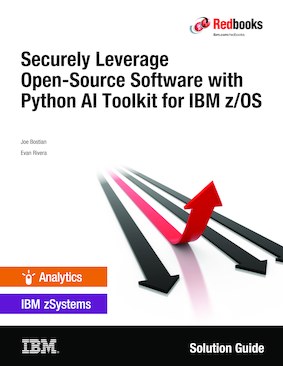About cookies on this site Our websites require some cookies to function properly (required). In addition, other cookies may be used with your consent to analyze site usage, improve the user experience and for advertising. For more information, please review your options. By visiting our website, you agree to our processing of information as described in IBM’sprivacy statement. To provide a smooth navigation, your cookie preferences will be shared across the IBM web domains listed here.

Published on 10 May 2023
Read in Google Books
Share this page:
ISBN-10: 073846113x
ISBN-13: 9780738461137
IBM Form #: REDP-5709-00
Authors: Joe Bostian and Evan Rivera
Abstract
Open-source software (OSS) is widely available and serves as an essential component for enterprises in the artificial intelligence (AI) and machine learning (ML) industry. Specifically, the open-source programming language Python is one of the most versatile and popular programming languages that are used in the world at the time of writing. This situation is especially true in the data science community, where Python provides many libraries and tools that enable essential AI and ML functions, and where it is supported by a large community of developers that actively contribute to its development.
Understanding and managing vulnerabilities within OSS can be complex because of the many components, dependencies, and contributors that are involved. Although the nature of OSS helps balance access to programming and technology, it also results in fast-paced changes to software, which emphasizes the importance of software currency to minimize security concerns. Enterprises understand the critical need to have access to and leverage reputable open-source projects with proper maintenance, updates, transparency, reliable support, and a sense of control to form a secure foundation for implementing AI solutions.
Python AI Toolkit for IBM® z/OS® is a powerful set of tools and libraries that is used to establish a secure foundation for AI development and deployment on z/OS so that enterprises can leverage their existing infrastructure for these mission-critical applications. The OSS that is provided within Python AI Toolkit for IBM z/OS is scanned and vetted for security vulnerabilities so that users can make informed decisions when leveraging these Python packages. Packages can be installed and managed by using the Package Installer for Python (pip), which is a common Python package manager, enabling a familiar, flexible, and agile delivery experience while empowering developers to build AI solutions.
Table of Contents
Did you know?
Business value
Solution overview
Solution architecture
Usage scenarios
Integration
Supported platforms
Ordering information